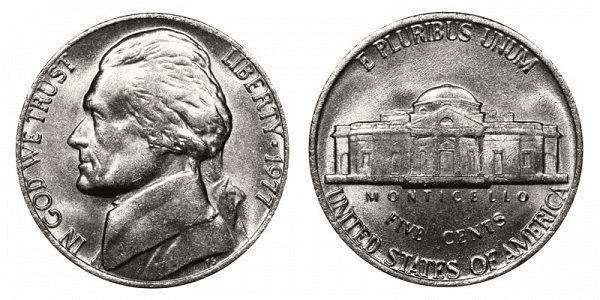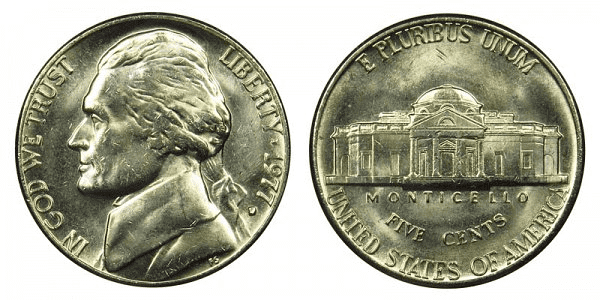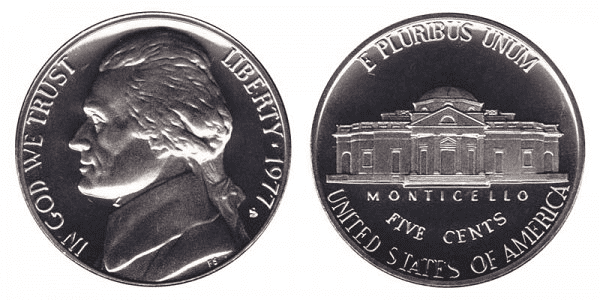What Is A 1977 Jefferson Nickel Made Of?
The 1977 nickels feature the bust of President Jefferson and are composed of 75% copper and 25% nickel. Since 1938, when it succeeded the Buffalo Nickel as the five-cent coin manufactured by the United States Mint, the Jefferson Nickel. Felix Schlag’s portrait of Thomas Jefferson, a founding father and third U.S. President, appeared on the coin’s obverse from 1938 to 2004.
The third President of the United States (1743–1826), Thomas Jefferson, is depicted on the front of the coin gazing left and wearing his long hair pulled back with a ribbon. The initials of the designer, FS (for Felix Schlag), are located below the shoulder. “IN GOD WE TRUST” is written around the left.
The word LIBERTY and the issue year, 1977, are separated in the right-hand corner by a five-pointed star. The Denver Mint’s or San Francisco Mint’s mint mark, which is a minuscule letter D or S, is located to the right of the image beneath the final digit of the date, respectively.
The stately home that Thomas Jefferson built for himself, Monticello, is seen in the coin’s back’s centre and is framed by a simple rim. Its name is then stated after that: MONTICELLO. The words “FIVE CENTS” are engraved all the way around this. Its motto is E PLURIBUS UNUM (from Latin: “Out of many, one”).
The legend UNITED STATES OF AMERICA is printed underneath in bigger characters.
1977 witnessed the debut of the first Star Wars film and the introduction of the first commercially available Apple II computers. The first commercial flight from Concord took off, and Elvis Presley passed away at the age of 42.
1977 Jefferson Nickel Varieties
1977 P Nickel (No Mint Mark)
Year: 1977
Face Value: $0.5
Composition: 75% copper, 25% nickel
Weight: 5g
Diameter: 21.21 mm
Thickness: 1.75 mm
Edge: Plain
Mint in: Philadelphia
Mint Quantity: 585,376,000

photo source: www.usacoinbook.com
1977 D Nickel
Year: 1977
Face Value: $0.5
Composition: 75% copper, 25% nickel
Weight: 5g
Diameter: 21.21 mm
Thickness: 1.75 mm
Edge: Plain
Mint in: Denver
Mint Quantity: 297,313,460

photo source: www.usacoinbook.com
1977 S Nickel
Year: 1977
Face Value: $0.5
Composition: 75% copper, 25% nickel
Weight: 5g
Diameter: 21.21 mm
Thickness: 1.75 mm
Edge: Plain
Mint in: San Francisco
Mint Quantity: 3,251,152

photo source: www.usacoinbook.com
List of errors
The 1977 Jefferson Nickel has no nationally-regarded errors and therefore all errors seen are on a coin-by-coin basis.
How Much Is A 1977 Jefferson Nickel Worth Today?
The inherent metal value of a 1977 nickel, which is $0.0574, is marginally higher than the coin’s face value, hence this coin’s value is determined by things like its condition, provenance, flaws, etc over any precious metal content.
Depending on condition 1977-P (no mint mark) nickels can be worth between $0.28 and $3.30. 1977-D Nickels can be worth a little more, ranging between $0.56 and $3.30. 1977-S coins are worth around $1.71 each.
How Does The Grading System Work?
The Sheldon Scale is used by numismatists to provide a numerical value to coins. The Sheldon Scale goes from poor (P-1) to perfect mint state (P-1) (MS-70). Coins were originally evaluated using words to reflect their condition (Good, Fair, Excellent, Etc.). Unfortunately, coin collectors and dealers had different ideas about what each of these terms represent.
Professional numismatists joined together in the 1970s and established CoinGrading standards. These numismatists now assign grades at key places on the seventy-point scale, using the most regularly utilized numeric points in conjunction with the original adjective grade. The following are the most common coin grades:
-
-
- (P-1) Poor – Indistinguishable and probably damaged; if used, must have a date and mintmark; otherwise, rather battered.
- (FR-2) Fair – Nearly smooth, but without the damage that a coin graded Poor often possesses. The coin must have enough detail to be identified.
- (G-4) Fair – Inscriptions have merged into the rims in some areas, and important elements have been mostly erased.
- (VG-8) Very Good- A little weathered, but all of the primary design elements are visible, albeit faintly. There is little if any, central detail left.
- (F-12) Good – The item is very worn, yet the wear is even, and the overall design details stand out clearly. Rims are almost completely isolated from the field.
- (VF-20) Very Fine – Moderately weathered, with some finer features still visible. The motto or all letters of LIBERTY are readable. Both sides of the coin have entire rims that are separated from the field.
- (EF-40) Extremely Fine – Gently used; all gadgets are visible, and the most important ones are bold. The finer details are bold and clear, however, light wear may be seen.
- (AU-50) Uncirculated – Slight evidence of wear on the coin’s design’s high points; may have contact marks; eye appeal should be adequate.
- (AU-58) Uncirculated Choice – Slight traces of wear, no severe contact marks, almost full mint shine, and great eye appeal.
- (MS-60) Mint State Basal – Strictly uncirculated; no indication of wear on the coin’s highest points, but an unsightly coin with reduced luster, visible contact marks, hairlines, and other flaws.
- (MS-63) Mint State Acceptable – Uncirculated, but with contact scratches and nicks, little reduced shine, but otherwise appealing appearance. The strike is weak to average.
- (MS-65) Mint State Choice – Uncirculated with great mint shine, very little contact blemishes, and exceptional eye appeal. The strike is unusually severe.
- (MS-68) Mint State Premium Quality – Uncirculated with superb luster, no obvious contact marks to the naked eye, and exceptional eye appeal. The strike is quick and appealing.
- (MS-69) Almost Perfect Mint State – Uncirculated with perfect brilliance, a sharp and appealing strike, and extremely good eye appeal. A near-perfect coin with minor imperfections in the planchet, strike, and contact markings (seen only under 8x magnification).
- (MS-70) Mint State Perfect – Under 8x magnification, there are no tiny imperfections discernible; the strike is crisp, and the coin is perfectly centered on a beautiful planchet. Rarely seen on a coin, this coin is bright and whole, with original luster and exceptional eye appeal.
-
Where To Buy Or Sell 1977 Jefferson Nickels?
Because of their virtually non-existent value, the best place to purchase 1977 Jefferson nickels is at flea markets, estate sales, or online marketplaces like eBay, where they’re mostly viewed as novelty coins or sentimental coins; such as for people born in the year, married in the year, and so on.
For more peace of mind, it is advisable to engage with trustworthy coin dealers and auction houses like Heritage Auctions when dealing with extraordinary or rare coins such as 1977 Nickels with distinctive errors.
FAQs
Where is the mint mark on a 1977 Jefferson nickel?
The mint mark on the Jefferson nickel is found on the obverse side of the coin to the right of Jefferson’s ponytail.
What nickels have the most silver?
Jefferson Nickels minted between 1942 and 1945 contain 35% Silver.
What are the key dates to look for in nickels?
Due to the silver content, 1942-5 nickels are worth looking out for. 1954 and 1955 nickels also have some quite sought-after error variants, as well as the 1971 ‘no S’ nickel.



